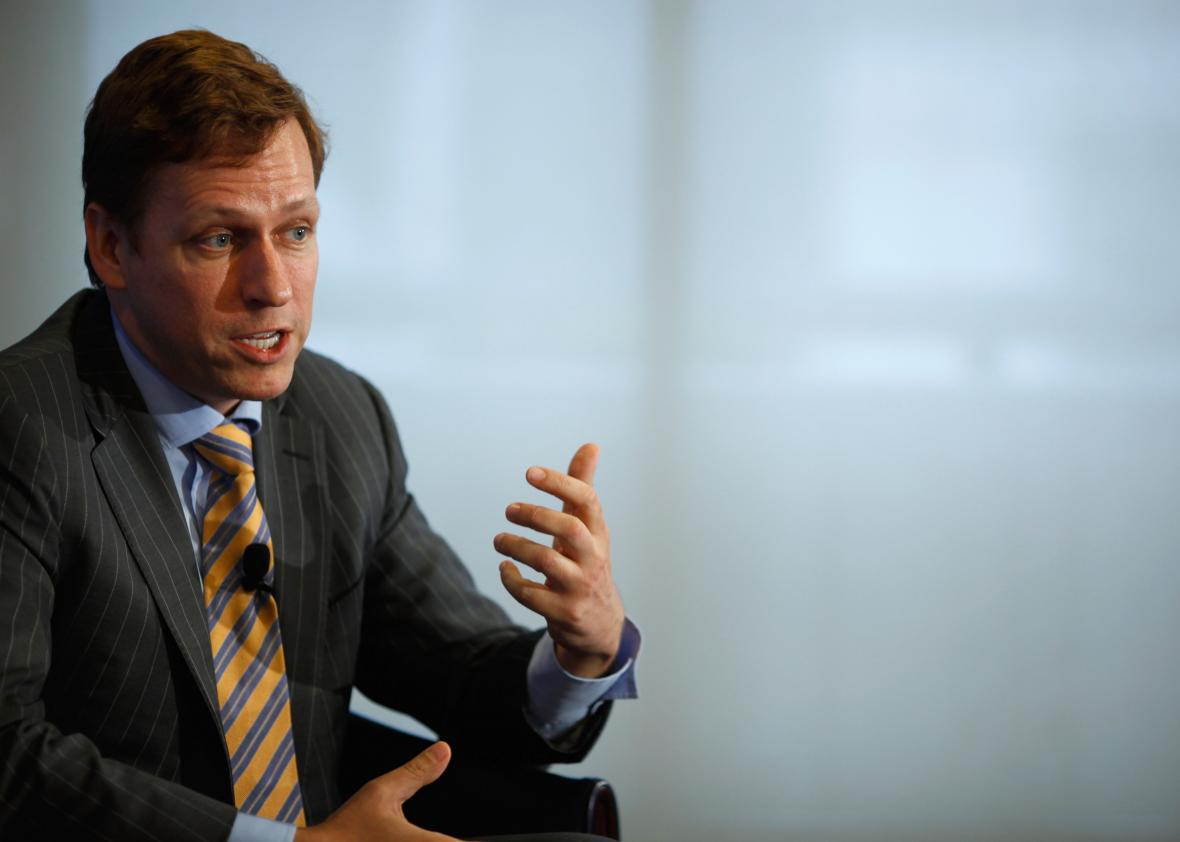Here’s an easy test of Facebook’s attitude toward journalism: whether Peter Thiel remains on its board of directors.
For now, Mark Zuckerberg and his company are staying silent. If Zuckerberg does ultimately allow Thiel to stay on the board, you’ll know how the CEO—who holds absolute control over the world’s most-powerful media company—feels about the free press. He wants to exploit it, but doesn’t honor it.
Thiel is the billionaire co-founder of PayPal—and an early, fabulously enriched investor in Facebook. He’s Zuckerberg’s friend and mentor, by all accounts.
He’s also the person who secretly funded a revenge—he calls it “deterrence”—lawsuit against a media company, Gawker Media, that engaged in speech he hated.
I’m not an unbridled fan of Gawker, though it has done some sterling, important journalism over the years. I had deep qualms about what its Valleywag site did years ago in telling the wider world what it said many in Silicon Valley already knew, that Thiel is gay. But there is no question that this was protected speech, and when Thiel embarked on his revenge campaign—ultimately using the odious Hulk Hogan, whose home-state judge and jury slammed Gawker in a recently concluded libel trial—he crossed a line.
The Hogan case is far from over, with appeals just starting, but Thiel may well be the instrument of Gawker’s destruction. That is vastly scarier than anything Gawker could imagine doing. As Fusion’s Felix Salmon pointed out, Thiel has given fellow members of the ultra-rich and powerful a “dangerous blueprint” for shutting down legal speech. (Note to people equating Gawker’s actions with Thiel’s: This is so far from equivalence that you embarrass yourselves.)
Thiel’s secret laundering of the Gawker lawsuit disqualifies him as someone who should be on a board of directors of any organization that claims to value freedom of expression. Facebook’s other directors, employees, and users should ask how much they want to be associated with a company that keeps someone like Thiel in a position of such power and influence.
This all comes in the context of Facebook’s exerting increasing control over what people say online in the U.S. and around the world. Conservatives freaked out when Gawker Media’s Gizmodo recently reported, using anonymous sources I still don’t trust, that Facebook was curbing their influence in the “trending” news section, through outright editing and manipulation by site editors. The conservatives were finally grasping, as too few of us seem to understand, what a single company controls in the fabled marketplace of ideas. Even if Facebook wasn’t manipulating information in this way now, it could.
Zuckerberg and company want journalists to move their stories and conversations inside Facebook, where the First Amendment is irrelevant and the Terms of Service determine what people can say. Journalism organizations, in their standard shortsighted way, are flocking to turn over publishing to a company that has demonstrated its untrustworthiness when it comes to honoring its privacy promises, and which is rapidly becoming the journalism trade’s most formidable business competitor.
As they hand their futures over to Silicon Valley billionaires, journalists need to remember what they should be doing: as the saying goes, “comfort the afflicted and afflict the comfortable.” Telling truth to, and about, power is the core of what journalism should mean but in the age of Trump and Thiel, too many “mainstream” journalists, not to mention the essentially co-opted tech press, have all but forgotten their duty.
Trump and Thiel belong in a sentence together, for several reasons. Both have declared war on journalism they don’t like. War, for them, is a take-no-prisoners affair. Trump, who’s sued or threatened to sue some journalists he couldn’t seduce, says one of his missions is to curb the press. Thiel, a Trump supporter and pledged convention delegate, has offered a case study in how to do it.
In this increasingly plutocratic era, we desperately need fierce watchdogs to monitor the predations and hypocrisies of billionaires and politicians who control so much of our world. If not journalists, who will fulfill that role?
And who will remind us, again and again, of free speech’s core, enduring principle: You defend your own right to speak when you defend the rights of people whose speech you loathe.
Facebook claims to believe in freedom of expression, and in journalism, and at some level that’s true. But every minute it allows Thiel to remain on its board of directors, it will be broadcasting how limited those values truly are.
Disclosure: One Slate editor is married to a Gawker editor. One is married to a lawyer who represented Gawker in the Hulk Hogan trial. One is a former Gawker Media executive editor. None of these Slate staffers worked on this story.
